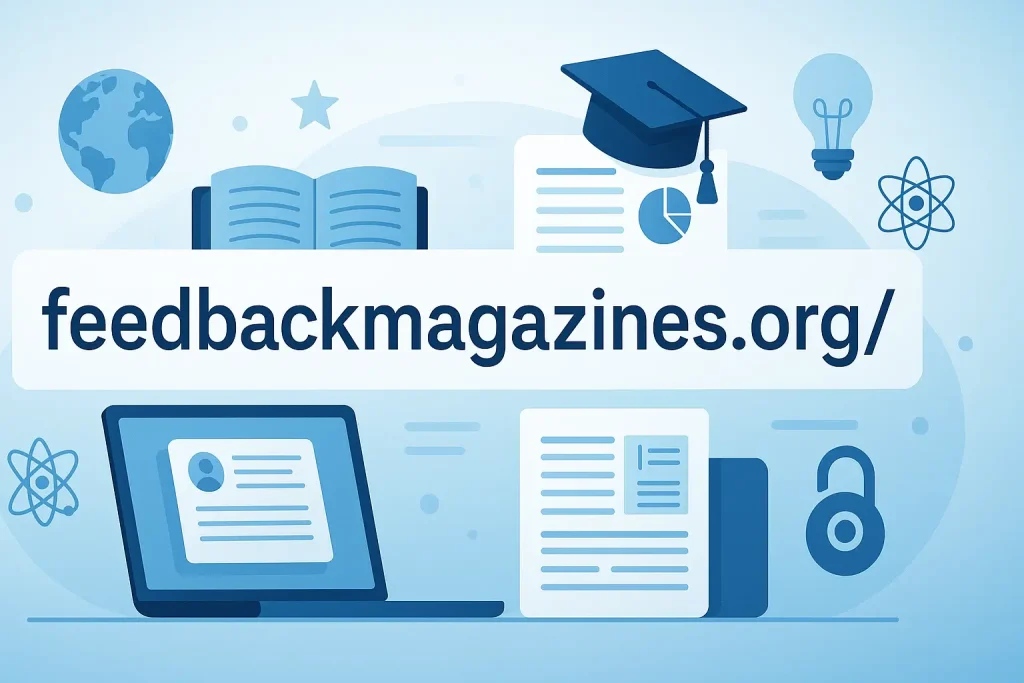
In today’s fast-paced academic world, where innovation meets accessibility, there’s a growing need for a trusted and open platform that brings researchers, students, and institutions together. That’s exactly what feedbackmagazines.org/ delivers—a revolutionary academic portal that redefines how research is published, shared, and reviewed. By combining ease of use with robust features, this platform is quickly becoming the go-to online research publishing site for scholars across the globe.
Whether you’re a student seeking exposure, a researcher aiming for recognition, or an institution in search of impactful visibility, feedbackmagazines.org offers unmatched tools to publish scholarly articles online, engage in peer review, and build academic networks—all within a free, user-friendly, and open-access environment.
What is feedbackmagazines.org/?
feedbackmagazines.org is a free journal submission platform built to empower academic minds. It serves as a digital hub for academic journals, streamlining the process of research publication and making academic work accessible to everyone. It bridges the gap between researchers, students, peer reviewers, and journal editors by fostering a collaborative publishing environment.
This digital library for academic articles stands out for its interdisciplinary research publications, enabling users to discover, contribute, and cite work across multiple fields. Whether it’s STEM, humanities, or social sciences, this platform provides a home for every kind of scholarly contribution.
Also Read: https://fizzymag.co.uk/voiceofconservation-org/
Mission and Purpose of the Platform
At its core, feedbackmagazines.org/ is dedicated to democratizing academic knowledge. The platform’s mission is to support open access research and eliminate barriers that limit who can publish or access scientific literature. This mission directly supports global researchers and ensures that academic discovery isn’t reserved for a privileged few.
Its purpose is to redefine how academic research is published—making it faster, fairer, and more engaging. With its inclusive academic journal submission platform, the site aims to transform how academic writing and peer review function in the digital era.
Core Features and Tools Offered
- One-click article submissions
- Real-time peer reviewer feedback
- Citation tracking tools
- Custom author dashboards
- Academic networking and collaboration channels
- Support for multimedia and data supplements
- Research analytics and performance metrics
- Secure author identification and profile verification
- Institutional publishing tools for universities
- Open access PDF and HTML formats
feedbackmagazines.org combines technical power with simplicity, making it an ideal space for both beginners and seasoned researchers. These tools are purpose-built to enhance your publishing workflow and expand your academic impact.
How It Supports Research Publishing
- Guided academic paper submission
- Structured feedback and editing suggestions
- Auto-formatting tools based on journal guidelines
- Visibility through digital indexing and libraries
- Open access repositories for greater reach
By offering a streamlined path from draft to publication, feedbackmagazines.org/ allows users to focus on research, not bureaucracy. The platform supports multiple file formats and integrates tools that reduce errors and boost publishing efficiency.
Peer Review and Editorial Process
Trustworthy publications start with solid reviews. That’s why feedbackmagazines.org uses a transparent, double-blind peer review system, allowing peer reviewers to provide constructive academic feedback without bias. This review ecosystem ensures every article meets global academic standards.
Journal editors are empowered with editorial dashboards to track submissions, manage reviewer assignments, and streamline decisions. These smart tools lead to faster turnaround times and more accurate peer-reviewed academic articles.
Key Benefits for Researchers and Students
- Zero-cost publishing with open access
- Cross-discipline academic exposure
- Direct feedback to enhance article quality
- Access to curated academic journals
- Boost in academic credibility and citation potential
For students, the platform provides an invaluable first step into the academic world, allowing them to gain confidence, get published, and build their academic profiles early in their careers. For researchers, it serves as a powerful platform to grow their influence in the scholarly community.
How to Submit Articles Easily
- Register for a free author account
- Upload your manuscript (PDF, Word, LaTeX supported)
- Follow academic paper submission guidelines
- Choose relevant journals or research categories
- Receive confirmation and peer review timeline
The submission interface is clean and intuitive, with step-by-step instructions and smart suggestions that ensure authors follow best practices. Even first-time authors find the process effortless.
User-Friendly Navigation Explained
feedbackmagazines.org/ was designed with simplicity in mind. Its minimalist interface allows users to browse, submit, or review with ease. Everything from the homepage to article pages is optimized for clarity, speed, and mobile access.
The platform’s advanced search engine lets users filter by discipline, keyword, author, date, or institution, making it easy to explore an ever-growing database of peer-reviewed academic articles.
Open Access and Free Publishing
Unlike traditional platforms that hide research behind paywalls, feedbackmagazines.org embraces the open-access movement. All content is freely available, supporting global visibility and inclusive knowledge sharing.
By eliminating submission and access fees, this platform makes academic publishing more equitable, particularly for students and researchers from underfunded regions or institutions.
Creating and Managing Author Profiles
Authors get personalized profiles that display their biography, expertise, published articles, citations, and feedback received. These profiles act as mini digital CVs, boosting visibility and helping researchers build their academic brand.
Verified authors can also link their ORCID IDs and institutional affiliations, creating greater transparency and trust in their work.
Multidisciplinary Research Access
From neuroscience to media studies, the platform hosts research across dozens of disciplines. This interdisciplinary focus supports cross-pollination of ideas and fuels academic innovation.
By breaking silos between fields, feedbackmagazines.org/ becomes a vibrant space for idea exchange, suitable for university collaborations and global initiatives.
Feedback Tools for Academic Growth
The built-in feedback system allows reviewers to leave detailed comments, improvement tips, and formatting suggestions—not just a score. These academic feedback tools accelerate learning and support scholarly development.
Authors can view feedback history, compare reviewer opinions, and incorporate changes, making each publication a stepping stone toward better writing.
Community and Collaboration Features
Collaboration is key to innovation. feedbackmagazines.org offers discussion forums, co-authoring tools, and project boards where users can connect, share ideas, and build research teams.
Researchers from different universities and countries can discover collaborators through their interests or expertise, helping them build strong academic networks.
Future Features and Platform Growth
The roadmap includes:
- AI-powered content suggestions
- Real-time collaboration for co-authors
- Gamified learning modules for students
- Institution dashboards with advanced analytics
- Mobile app for submissions and notifications
With continuous feedback from the community, the platform is constantly evolving to become even more powerful and accessible.
Why Students Prefer This Platform
- Free and open access with no publishing fees
- Beginner-friendly design and tutorials
- Valuable feedback for improving academic writing
- Boosts resumes with credible publications
- Helps build academic confidence early
It’s more than a tool—it’s a launchpad for student researchers worldwide.
User Reviews and Testimonials
The feedback has been overwhelmingly positive. Many users report improved confidence in writing, higher visibility of their research, and even collaborations formed through the site. One PhD student writes: “I never thought publishing could be this easy and empowering.”
Experts applaud the platform for its ethical stance, simplicity, and inclusivity—qualities that make it stand out in the sea of academic publishing tools.
Comparison With Other Platforms
Unlike sites with hefty publication charges or closed-access policies, feedbackmagazines.org champions openness and fairness. It provides equal opportunities for all, whether you’re at a top university or just starting out.
Its combination of editorial tools, open access, and community support makes it the best platform for student research papers and academic scholars alike.
Boosting Research Visibility and Reach
All published work is indexed in digital libraries and shared across open access repositories, making it discoverable worldwide. With integrated citation tracking tools, authors can monitor the impact of their work in real time.
Social sharing options, downloadable content formats, and DOI assignments make every publication easy to access, share, and cite.
Feedback and Improvement Systems
Through real-time feedback, revision tracking, and post-publication commentary, authors are continuously encouraged to refine their work. This feedback cycle supports both quality and growth, ensuring that each article improves over time.
Unlike static publishing platforms, feedbackmagazines.org keeps authors involved and learning.
Ethics, Copyright, and User Trust
All content is governed by strict copyright policies, and authors retain full rights to their work. The platform follows COPE publishing guidelines, ensuring transparency, ethical behavior, and integrity in academic publishing.
Security protocols and author verification also protect users and their content from plagiarism or misuse.
Support for Universities and Groups
Universities and research institutions benefit from institution-level publishing dashboards, custom journal setups, and group submission tools. These features help universities amplify the impact of their academic output.
Institutional partners also receive analytics, citation reports, and branding options for their contributors.
Networking and Academic Influence
Academic influence is about more than just citations—it’s about connections. Authors on feedbackmagazines.org can build global research networks, collaborate on projects, and even get invited to conferences or special issues through their work’s visibility.
These scholarly communication tools give users the spotlight they deserve.
Full Guide to Using the Platform
- Create an account with email verification
- Complete your profile and research interests
- Start a new submission with guided steps
- Upload files and review guidelines
- Submit for peer review and track progress
- Accept edits and publish when approved
- Share your published article with your network
Every step is simplified for maximum productivity and clarity.
Real-World Impact of Research Shared
Published research isn’t just read—it’s acted upon. From policy change to educational reform, many articles on feedbackmagazines.org have influenced real-world decisions. That’s the power of open access knowledge—it goes beyond academia.
The platform’s reach and accessibility make it ideal for global collaboration, media coverage, and industry applications.
FAQs
Is feedbackmagazines.org really free to use?
Yes, there are no submission or access fees.
Can I publish without institutional affiliation?
Yes, the platform welcomes independent scholars.
Is there a review time guarantee?
While timelines vary, the platform aims for reviews within 2–4 weeks.
How is content protected?
Through copyright retention, author verification, and anti-plagiarism checks.
Can I publish in multiple disciplines?
Yes, the platform encourages interdisciplinary work.
Final Thoughts
feedbackmagazines.org isn’t just a platform—it’s a movement. It represents the future of academic publishing, where openness, accessibility, and growth go hand-in-hand. For students, researchers, and universities, it offers tools that matter, feedback that helps, and a community that cares.




